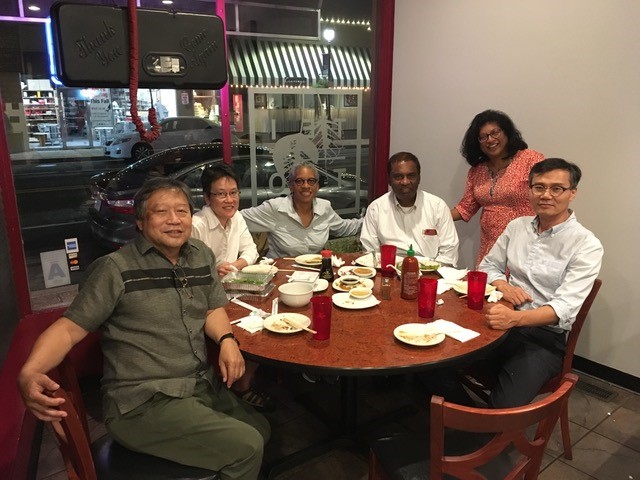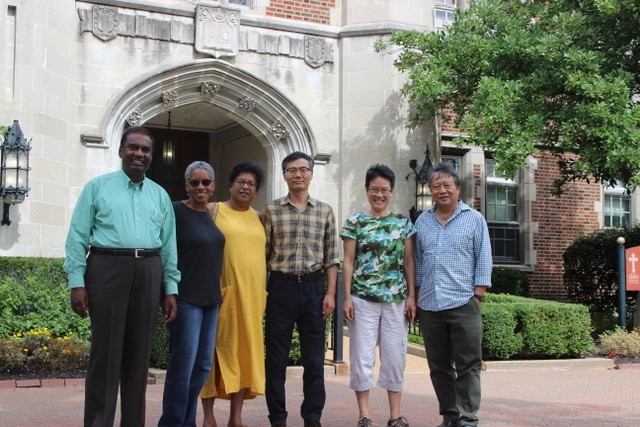Above: The peer mentors stop to pose for a photo in front of the Press Administration Building, while taking a walk around Eden’s campus. (From left: J. Samuel Subramanian (UTS), Pamela Ayo Yetunde (UTS), Damayanthi Niles (Eden), Soe, Bo Myung (CTS), Sharon Tan (Eden) and Eleazar Fernandez (UTS))
A grant from Wabash Center for Teaching and Learning in Theology and Religion made it possible for six faculty of color, from three seminaries, in three states to meet on Sept. 27 and 28 at Eden, for the first of two meetings.
The group, “Leading from the Margins,” started by Dr. Sharon Tan, Acting Dean of the Seminary and Professor of Theological Ethics at Eden, explored the family system model to see how it can help them think through agency, power, and connections.
The group consists of Eden professors Dr. Damayanthi Niles, professor of Constructive Theology and Dr. Tan. As well as Eleazer Fernandez, J. Samuel Subramanian and Pamela Ayo Yetunde professors from United Theological Seminary of the Twin Cities and Bo Myung Seo from Chicago Theological Seminary. They are all minority professors from United Church of Christ Seminaries and in the Midwest.
“This Wabash grant is aimed at supporting mid-career minority faculty in leadership training,” Tan said. “It’s a well-known organization that seeks to improve the quality of teaching and learning in theology.”
They do several types of workshops with different types of faculty. Tan found out about the opportunity after being involved in another Wabash workshop, which looked at issues of race and theological education. Last spring, she submitted a grant application and after working to shape what it would look like, received the grant for the 2019-2020 academic year.
“Leading from the margins” was inspired from when Tan first became dean several years ago at United Seminary and realized she needed to learn more about leadership and leading other people in a theological sense.
“I started trying to do some reading in that and there’s a ton a business leadership material out there. I realized that material was written by white people for white people,” Tan said. “Some of the advice didn’t seem to fit and didn’t address some things that I was looking for answers to.”
When this grant opportunity came up, Tan decided to extend the idea to other colleagues to think about how they might be able to add to and talk about theological leadership.
The name, “Leading from the Margins,” came from the reality that minority faculty can feel like they are not at the center when working at a majority white institution.
“They’re on the margins of the dominant culture. There have been books about doing theology from the margins, doing ethics from margins, so the term ‘from the margin’ is not totally unknown,” Tan said.
Leadership from the margins will be an opportunity for those in the group to feel like they are not on the margin, their learning and development as leaders are the purpose, not a byproduct, of the study.
“We talked about the nature of belonging and I think everybody left feeling that they belonged to each other,” Tan said.
Niles said when she got together with the group, she no longer felt like she had to explain her thought process, what she was saying just clicked with the other professors.
“It was very powerful to not be on the sidelines,” she said.
Niles said it was nice that the six of them work in different fields, areas of interest and have connected in so many cool ways.
“We could free think. We had the fun of imagining wildly,” Niles said.
They will meet again, next spring or early summer.
“In between now and the next (in person) meeting there will be Zoom meetings once a month. Doing some reading and talking,” Tan said.
The hope is to keep the group going with an outcome, in the next few years, of an edited volume.
One of the professors in attendance was Eleazar S. Fernandez, a professor at United. He is the most senior of the group that met, and the most famous, Tan said.
“For the last five or six years, he’s also been president of Union Theological Seminary in the Philippines. He doesn’t sleep,” Tan said. “He works in the daytime here (at United) and in the nighttime here, he works for the Philippines, daytime there.”
Tan said that he’s enormously productive and it was an honor to have him there.
“He doesn’t go around telling people what he knows, he asks questions,” Tan said.
“What I wanted from him, and I’ve told him, is a comparison of the power he has as a minority faculty member here (at United), he’s the most senior one but minority in a majority white institution. To being president in the Philippines where he’s not only the most powerful (as president) but also in the majority race and culture. What does he get to do there that he doesn’t get to do here, some insight into comparing those,” Tan said.
“He seemed intrigued by the question, although I’m pretty sure he’s thought about it.”
He didn’t give an answer that weekend.
“I think he wants to figure out more about what he wants to say before he says it.”
Tan said it was a productive and encouraging couple of days.
“I think diversity is a gift,” Tan said. “People who we don’t know, people from other cultures bring gifts. We want those gifts, it makes all of us better people.”



